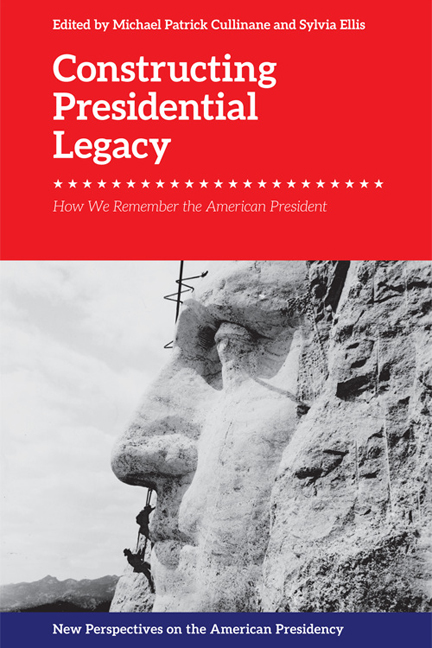Book contents
- Frontmatter
- Contents
- Acknowledgments
- Notes on Contributors
- An introduction to Presidential Legacy
- 1 Presidential Temples: America’s Presidential Libraries and Centers from the 1930s to Today
- 2 Presidential Legacy: A Literary Problem
- 3 Pennsylvania Avenue meets Madison Avenue: The White House and Commercial Advertising
- 4 Eisenhower’s Farewell Address in History and Memory
- 5 Pageantry, Performance, and Statecraft: Diplomacy and the Presidential Image
- 6 “You’ve got to decide how you want history to remember you”: The legacy of Lyndon B. Johnson in film and Television
- 7 The Farewell Tour: Presidential Travel and Legacy Building
- 8 Reflecting or Reshaping?: Landmark Anniversaries and Presidential Legacy
- 9 From a “New Paradigm” to “Memorial Sprawl”: The Dwight D. Eisenhower Presidential Memorial
- 10 Top Trumps: Presidential Legacies, New Technologies, and a New Generation
- Epilogue: Confessions of a Presidential Biographer
- Index
8 - Reflecting or Reshaping?: Landmark Anniversaries and Presidential Legacy
Published online by Cambridge University Press: 01 May 2021
- Frontmatter
- Contents
- Acknowledgments
- Notes on Contributors
- An introduction to Presidential Legacy
- 1 Presidential Temples: America’s Presidential Libraries and Centers from the 1930s to Today
- 2 Presidential Legacy: A Literary Problem
- 3 Pennsylvania Avenue meets Madison Avenue: The White House and Commercial Advertising
- 4 Eisenhower’s Farewell Address in History and Memory
- 5 Pageantry, Performance, and Statecraft: Diplomacy and the Presidential Image
- 6 “You’ve got to decide how you want history to remember you”: The legacy of Lyndon B. Johnson in film and Television
- 7 The Farewell Tour: Presidential Travel and Legacy Building
- 8 Reflecting or Reshaping?: Landmark Anniversaries and Presidential Legacy
- 9 From a “New Paradigm” to “Memorial Sprawl”: The Dwight D. Eisenhower Presidential Memorial
- 10 Top Trumps: Presidential Legacies, New Technologies, and a New Generation
- Epilogue: Confessions of a Presidential Biographer
- Index
Summary
On February 7, 1909, the Chicago Tribune printed what they deemed the “The Great Issue of the World's Greatest Paper.” Weighing in at a mighty 3¼ pounds, this Sunday edition of the Tribune composed 194 pages, and placed prominently on the front page a cartoon depicting a young boy in a rocking chair excitedly reading “The Story of Lincoln.” Underneath the drawing, the Tribune mused that “Somewhere in this country today there is an unknown boy who will be the country's greatest living man forty years from now.” Undoubtedly, with the 100th anniversary celebrations of Lincoln's birth fast approaching, the editors were making it clear where the newspaper proudly stood on the “Great Emancipator’s” legacy. Two days later, the nation (parts of the white South excepted) followed suit. In Chicago, businesses shut down to enable the public to attend special centennial events, including a speech by the president of Princeton University, Woodrow Wilson. In New York, one million people took part in Lincoln celebrations, while in Kentucky, President Theodore Roosevelt gave a moving speech before laying the cornerstone of a new Lincoln Memorial. Beyond American shores, the Brazilian navy ordered a 21-gun salute to “that noble martyr of moral and neighborly love.” Caught up in the Lincoln haze, scholars also churned out Lincoln books and poets penned odes to a great man. And perhaps most significantly, the National Association for the Advancement of Colored People (NAACP) was officially formed on February 12, 1909—exactly one hundred years since Honest Abe's birth. The Lincoln Centenary, it is fair to say, was not a small affair.
Presidential anniversaries, and the way American society chooses to mark them, reveal a great deal about presidential legacy. Nevertheless, the scholar Merrill D. Peterson observes that “The commemoration of the one hundredth anniversary of Lincoln's birth was one of those events that took up more space in the actual observance than it would in the historical record.” Indeed, while historians have lavished attention on the popular outpouring of grief that trailed Lincoln's body as it made its winding journey from Washington, DC to Springfield, Illinois in 1865, they have not given similar consideration to the Lincoln Centenary. Yet both events reveal much about Lincoln's legacy during the time in which they took place.
- Type
- Chapter
- Information
- Constructing Presidential LegacyHow we Remember the American President, pp. 206 - 226Publisher: Edinburgh University PressPrint publication year: 2018



